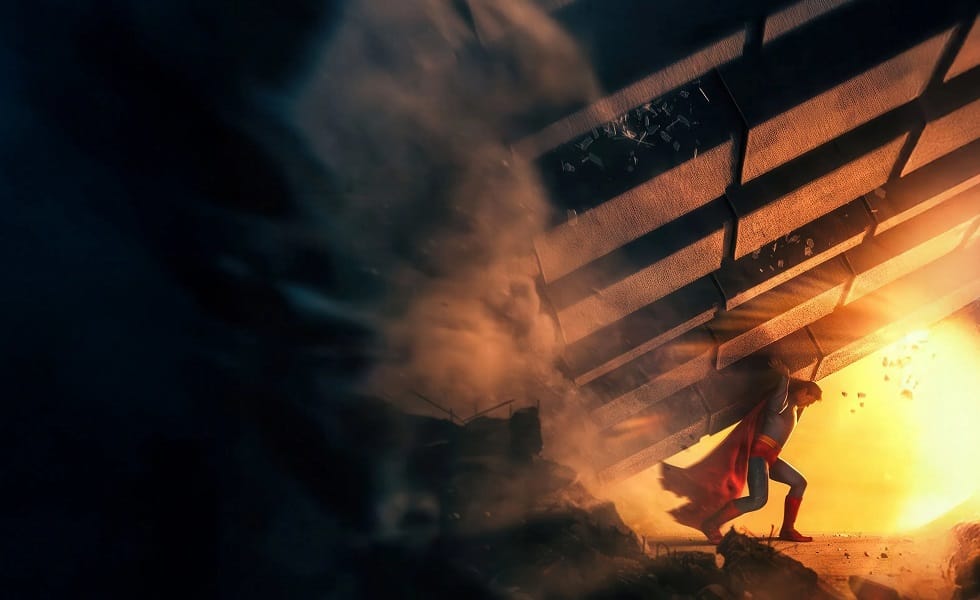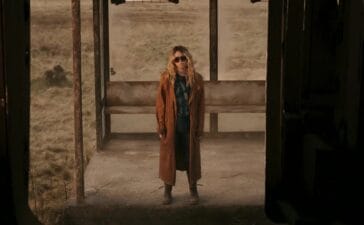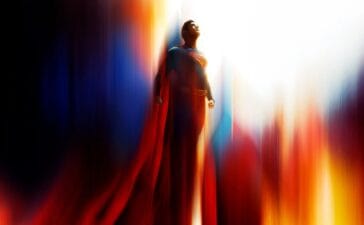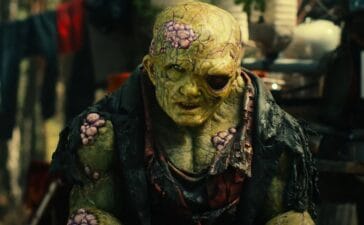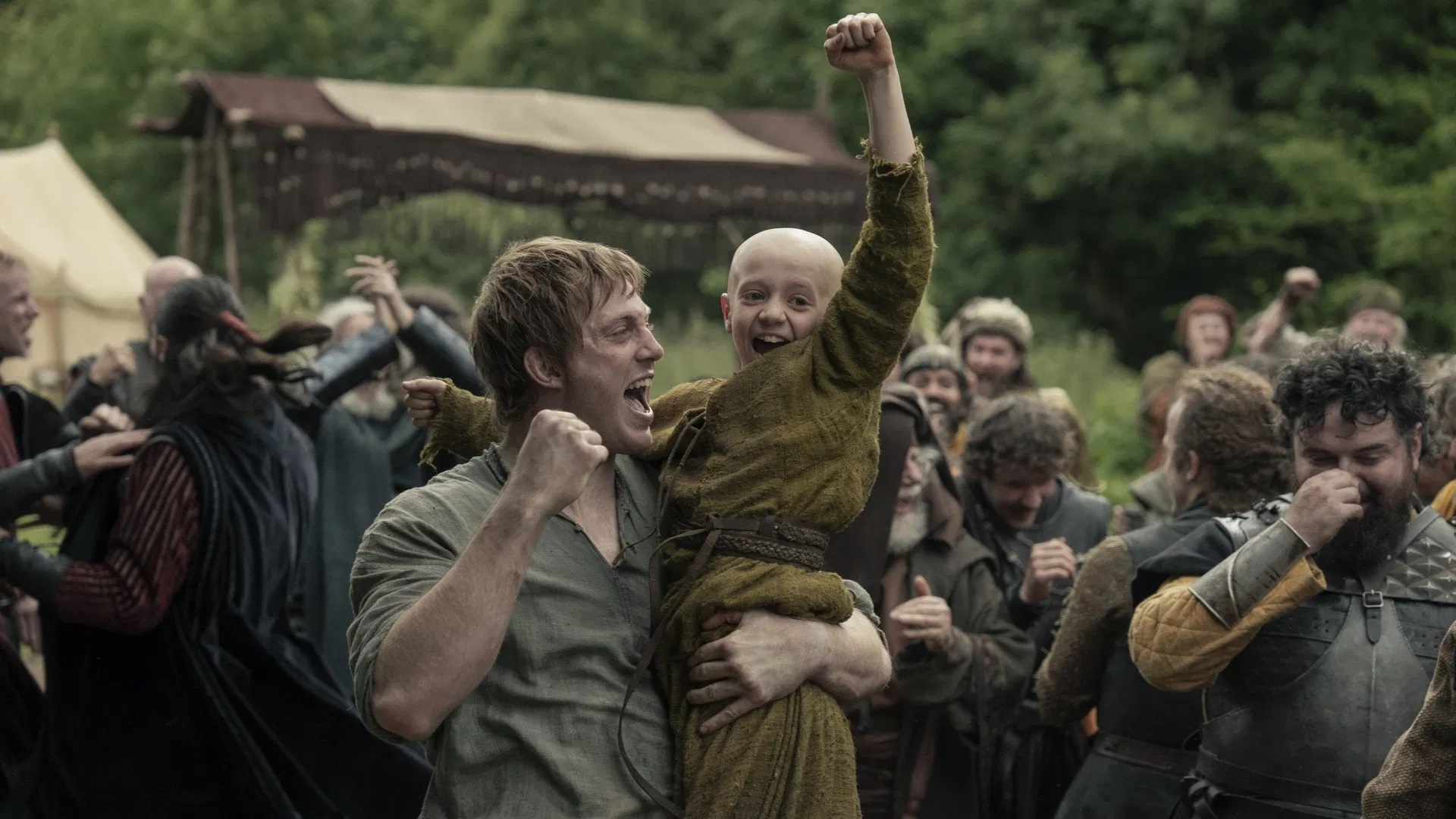James Gunn and Warner/DC have managed to reboot Superman for the modern world.
As the technological superior, Luthorcorp funded, US allied and fictional nation of Boravia amasses troops along the border with the Muslim coded and under-armed nation of Jahandpur, we see a child furiously painting a symbol onto a flag and holding it aloft. The symbol, we see, is that of Superman, the iconic sweeping S scrawled onto a yellow background with a child’s hand, and as it is raised in the air, the soon to be invaded Jahandpurians begin to chant. “Superman! Superman! Superman!”
Seeing a Palestinian coded child chanting “Superman! Superman! Superman!” was not on my 2025 bingo card. Neither was seeing Lex Luthor (Nicholas Hoult) accuse Superman (David Corenswet) of “grooming” humanity and keeping a (hashtag) secret harem of human women to breed a half-Kryptonian master race. And I’m not even going to get into his troll army of flying monkeys or his secret prison/black site inside a pocket universe where he keeps his enemies and troublesome ex-girlfriends. Elon Musk, eat your heart out.
All this and more is on offer in James Gunn’s Superman, and although the film is at best uneven and choppy – in other words an absolute mess – seeing a comic book movie take some big artistic and political swings is a fresh breath of colour in a world of washed-out greys, even if it only lands about half of them.
The first film in Warner’s attempt to relaunch their DC film slate with James Gunn as their Kevin Feige-style mastermind, Superman leans into the camp and crazy aspects of the character in the comics, coming off more Adam West Batman than Christopher Nolan. Gone is the dour and ponderous tone of Zack Snyder’s Man Of Steel (itself a poor man’s imitation of Nolan’s Dark Knight trilogy) with Gunn’s Guardians Of The Galaxy sense of fun and craziness taking its place, with Krypto the Superdog and Superman’s famous red undies coming along for the ride as well.
This is made clear immediately, the film beginning with Superman having lost a battle for the first time and calling on Krypto to come and rescue him. Krypto being a dog, doesn’t understand the situation and wants to play, jumping on the injured superhero and pulling at his shirtsleeve as the Son of Krypton calls out in pain and pleads with the alien canine for help. Anyone who’s been woken up by their dog wanting to go for a walk when you’re hungover will sympathise with our man Kal-El here.
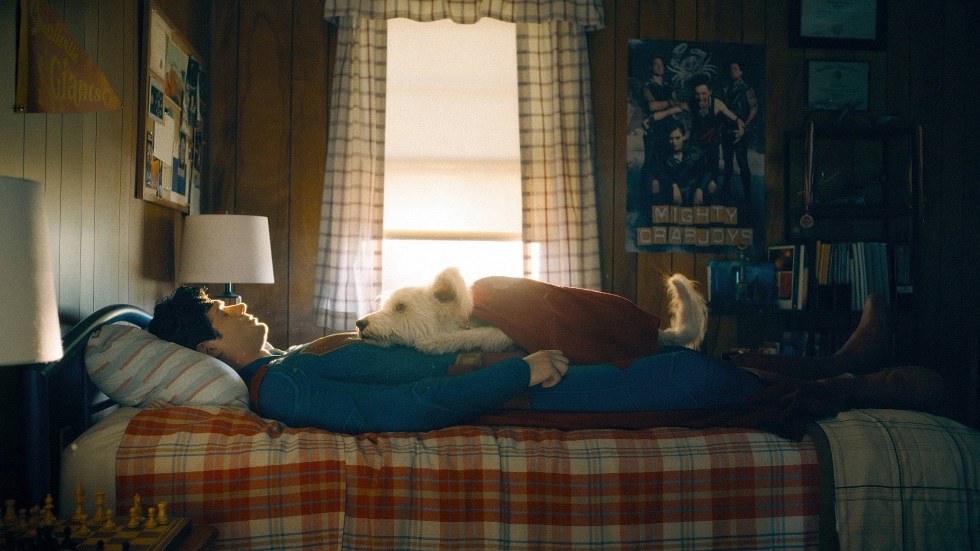
The wackiness continues to build from there. We get to see a classic crystal Fortress of Solitude emerge from the arctic ice, and are introduced to the comic relief Superman Robots (Alan Tudyk voicing prime robot “4”) while also being given an abridged version of Superman’s origin via an incomplete message from his parents (Bradley Cooper and Angela Serafyan) sent along with him to Earth from dying Krypton.
Gunn’s trademark surreal humour is peppered throughout the film, but no character gets as many hilariously unhinged moments as Hoult’s Lex Luthor, who singlehandedly steals every scene he is in. Hoult’s performance is an absolute delight, the actor taking every opportunity to smirk, snivel, and snipe his way through Gunn’s dialogue. And in a film whose main character must read as earnest and good, a scenery-chewing arch villain is just the counterpoint we need to Superman’s relentless optimism and positivity.
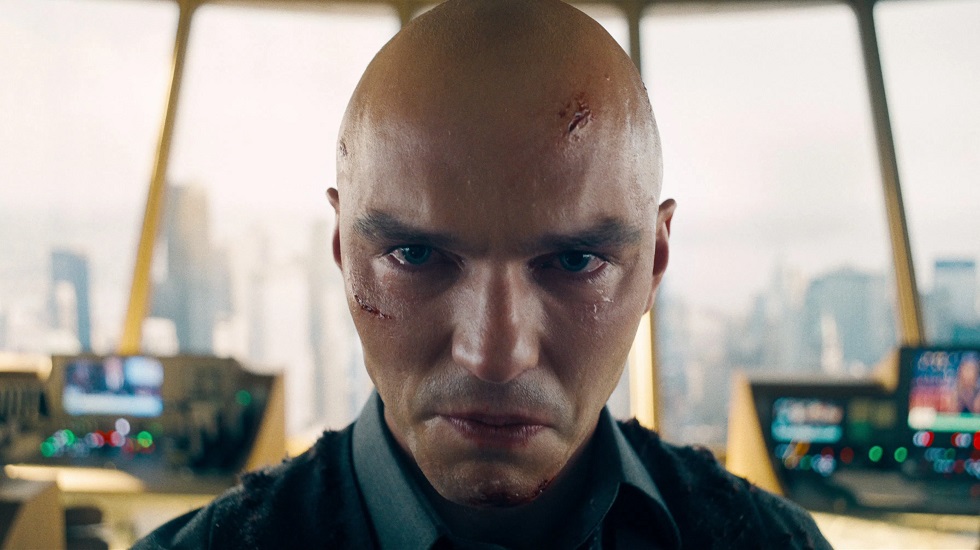
Luthor also gives the film its political edge and narrative drive, as without his machinations to turn the world against Superman, we’d just be watching a man in a ridiculous costume rescue innocent people and fight bad guys. Boring.
The completion of Luthor’s plot to turn the world against Superman also gives the Man Of Steel a character arc. Breaking into the Fortress of Solitude, Luthor discovers the message that Superman’s parents sent along with their son to guide his mission on Earth. Damaged in the journey, Superman had always believed the message to be a call to serve the people of Earth and to be a good man. However Lex along with his nanobot-infused henchwoman The Engineer (María Gabriela de Faría) manages to restore the message, revealing that rather than command him to serve the people of Earth, Superman’s parents command him to rule them, to take many wives and rebuild the people of Krypton. That’s right, Superman has fascist parents.
This then sets up Luthor’s accusations of Superman “grooming” humanity with his boy scout routine, culminating in the hilarious and absurd #secretharem line, Gunn clearly spoofing the alt-right and Qanon’s obsession with colouring the democratic party as a secret cabal of deep state child molesters. #Pizzagate anyone? More than that, it also sets up the key personal conflict within Superman’s character, with the Man Of Steel forced to steer his own way through this conflict and having to question his very nature and reason for being.
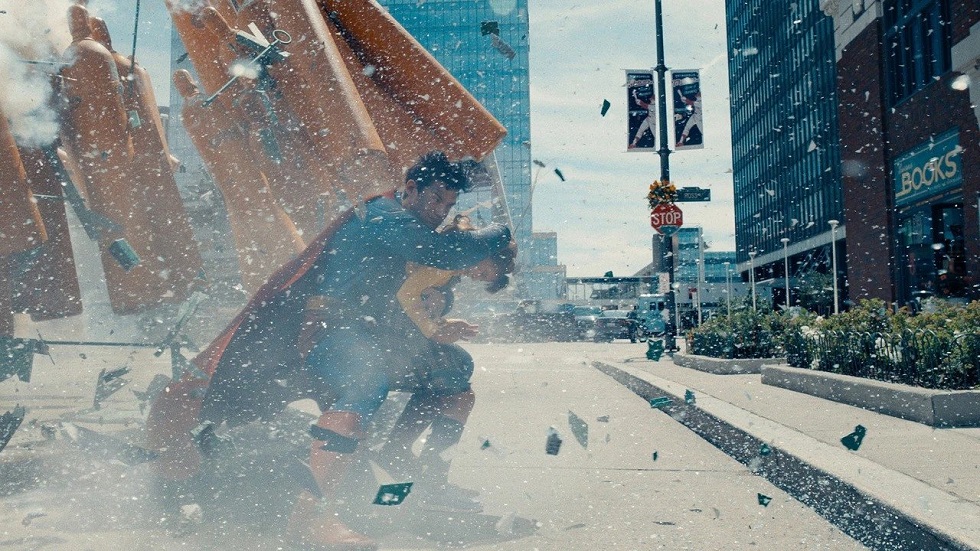
This is the film’s secret sauce and what makes it the most entertaining Superman film since the original Richard Donner and Richard Lester movies of the ’70s and early ’80s. As almost every critic who wrote about this film before its release made clear, Superman is a difficult character to make interesting because he is just too good.
While heroes like Batman and Tony Stark have either a dark past or depressive/egomaniacal personality issues to add conflict and nuance to their characters, Superman is the proverbial boy scout, too good and wholesome for modern audiences who prefer their heroes to have some dirt under their nails. Or so the common wisdom would have us believe.
How do you make an interesting Superman film then? Gunn’s solution is simple. You lean on the villains and supporting characters to bring vibrancy to what would otherwise be a black and white world.
By doing this, Gunn is able to infuse the film with a far more complex and interesting political backbone. Where Superman represents a view of the world where right and wrong are clear, killing people is bad, and saving them is good, Luthor represents the world we live in, where the agendas of billionaires and nation states are more important than human life, and innocent people being caught in the crossfire is the price of doing business.
This conflict is explicitly stated in a scene between Superman/Clark Kent and Lois Lane (Rachel Brosnahan) where Lane interviews the superhero and presses him on the moral and practical implications of him preventing Boravia from invading Jahandpur. Did he consult the President? Did he use the threat of physical violence to coerce the Boravian leader into submission? Does he seriously believe that Jahandpur’s government doesn’t also have a history of authoritarianism and other immoral behaviour?
Superman’s answer to all these questions is simple. “People were going to die!” This is the old fashioned morality that the character represents, and it’s a difficult position to argue against without descending into moral relativism, excusing the atrocities of one nation so long as their enemy was worse.
Which is exactly where Lex Luthor takes the public discourse. Representing the modern world of private capital and tech billionaires using their media empires to manipulate public opinion, Luthor manages to cloud Superman’s simplistic view of good and evil so he can operate in the grey area and gain moral superiority for his own authoritarian aims. Luthor is even referred to as wanting to make himself king in the film’s most explicit anti-Trump moment, and his imprisoning of his ex-girlfriend for writing a blog about him is clearly a jab at Elon Musk, one of many.
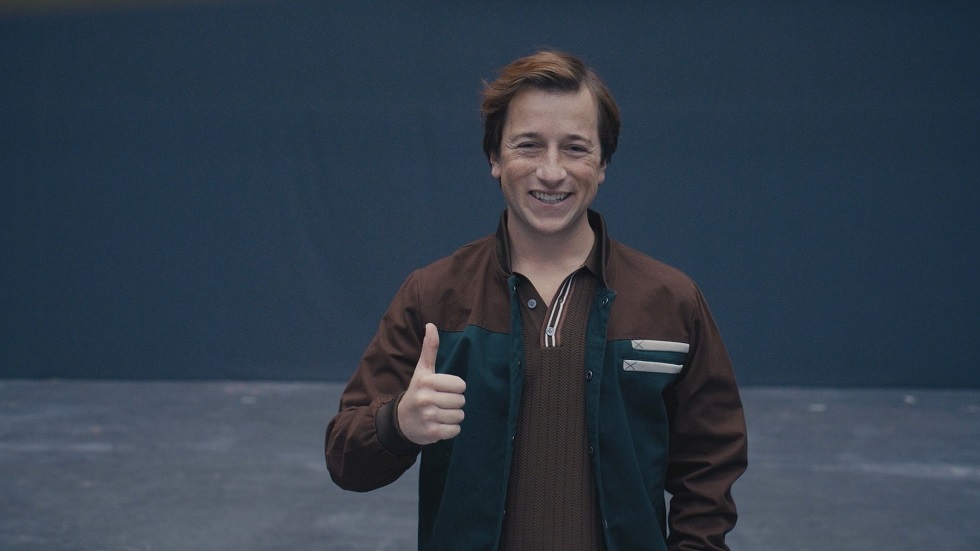
While some critics may label this as Superman going woke, looking back at the history of the character and its creators Jerry Siegel and Joe Schuster – who once used the Superman radio show to help fight the KKK – this is more a return to form for the Last Son of Krypton rather than a reinvention. And by bringing the character back into a conversation with the real world, Gunn’s film makes him interesting again. Superman now holds a mirror up to our own morality, suggesting that empathy and kindness are the true acts of rebellion in a world driven by greed and fear.
Most importantly though, Gunn shows us that this purity of mission is both Superman’s biggest weakness and greatest strength. It is only because of his predictably moral conduct that Luthor is able to manipulate events against Superman in the first place. Yet it is also Lex’s own immoral behaviour that eventually turns his allies against him and gives Superman the opening he needs to escape and fight another day. This, along with some great journalism from Lois Lane, eventually sees him win back the trust of the people and turn the tide against Luthor and his cronies.
By putting Superman back into context with the real world, and by making his victory contingent not just on his powers but on the support of his friends, Gunn makes the character relevant again in a way Zack Snyder never could. Whereas the SnyderVerse explored how humanity would handle being brought into a world of godlike beings, Gunn asks the opposite. How does a godlike being handle being thrust into a world of human morality?
Superman then becomes a catalyst for us to question our own mores and he allows Gunn – and Nathan Fillion’s Green Lantern, Guy Gardner – to literally give the finger to authoritarians and tyrants the world over (but also to one country in particular). And in taking Superman’s do-gooder nature as a challenge and embracing it without fear or reservation, Gunn has achieved what many thought was impossible – a funny, entertaining and absolutely wild Superman movie.


